Module 11 Unit 3 Language in use 课件(共26张PPT)外研版英语七年级下册
文档属性
| 名称 | Module 11 Unit 3 Language in use 课件(共26张PPT)外研版英语七年级下册 | 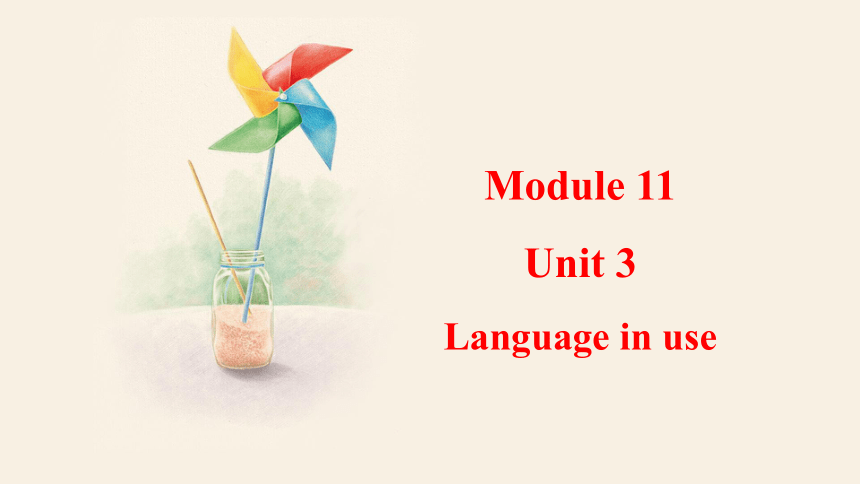 | |
| 格式 | pptx | ||
| 文件大小 | 2.1MB | ||
| 资源类型 | 教案 | ||
| 版本资源 | 外研版 | ||
| 科目 | 英语 | ||
| 更新时间 | 2023-12-30 16:11:05 | ||
图片预览

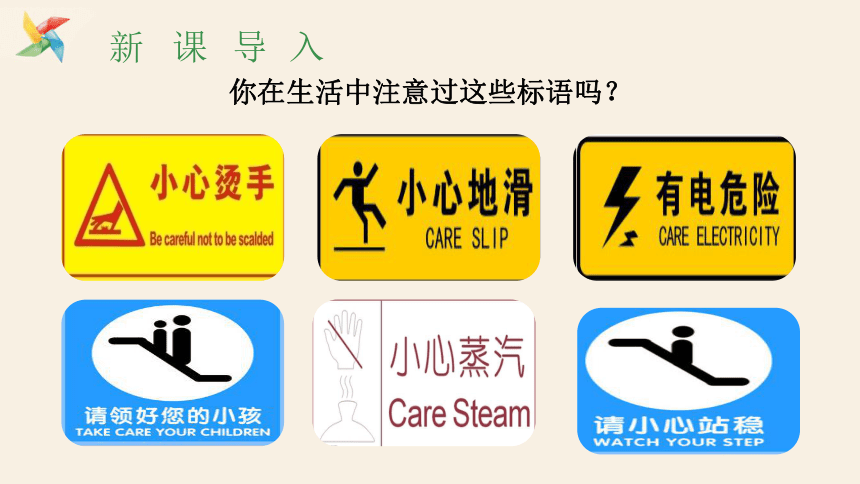

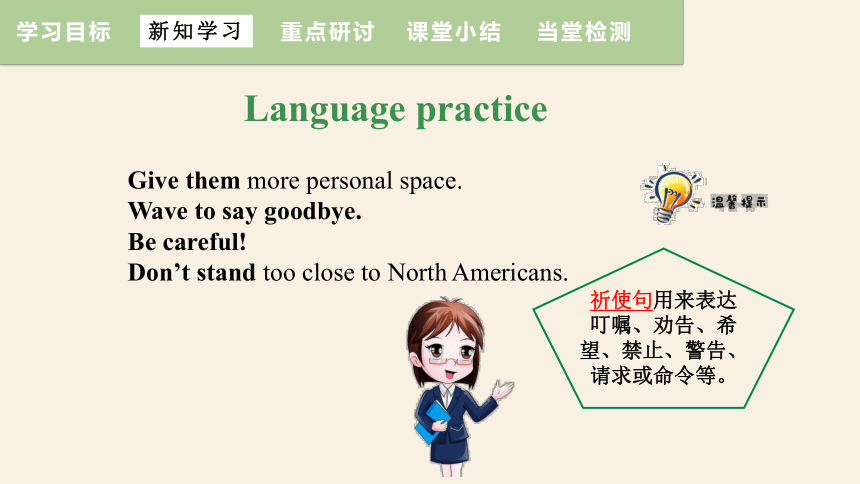
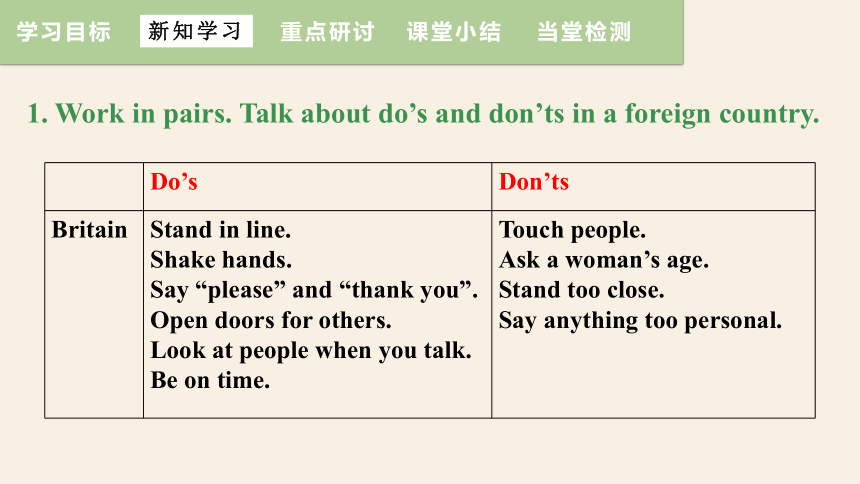

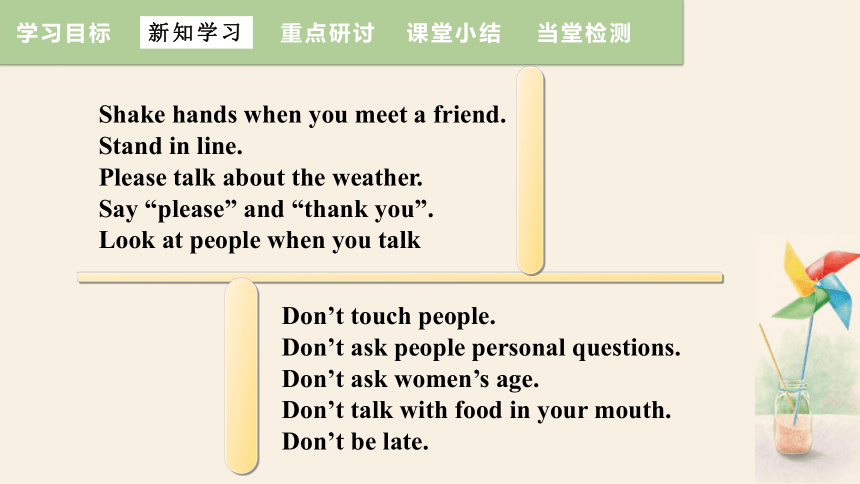
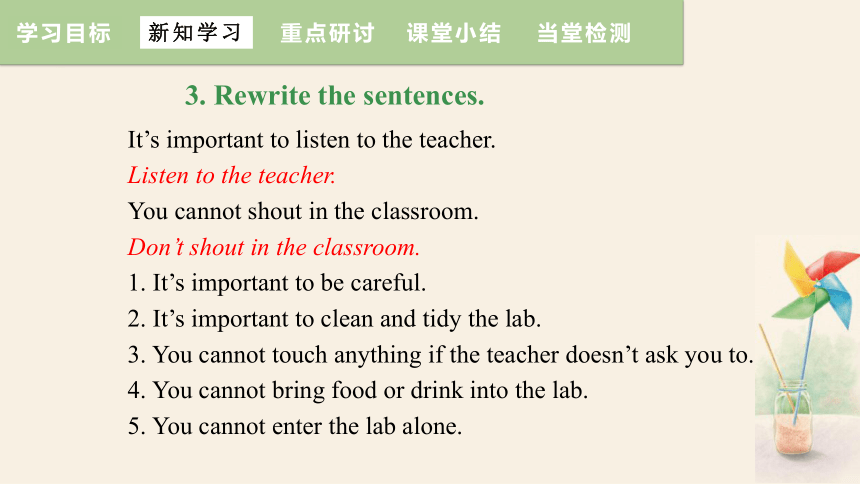
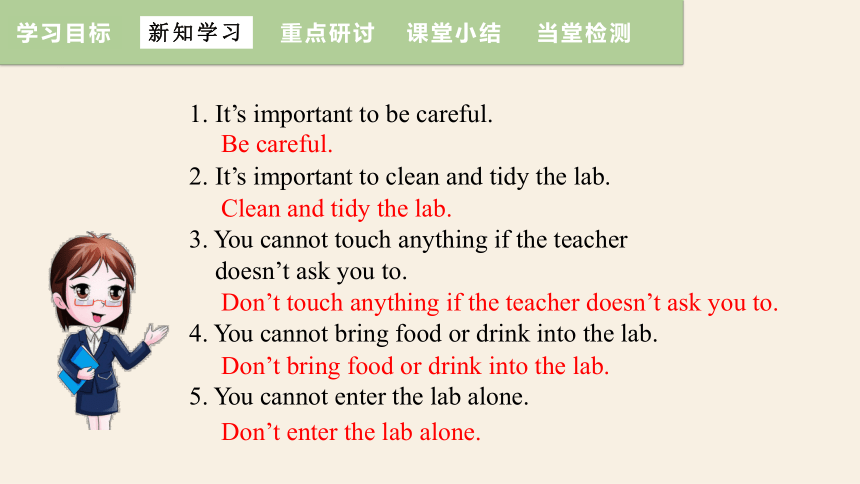
文档简介
(共26张PPT)
Module 11
Unit 3
Language in use
新
课
导
入
你在生活中注意过这些标语吗?
Language Goal
新知学习
课堂小结
当堂检测
学习目标
重点研讨
1. 能熟悉并能正确运用本课时出现的新单词和短语
2. 能够进一步巩固祈使句的用法
新知学习
课堂小结
当堂检测
学习目标
重点研讨
Language practice
Give them more personal space.
Wave to say goodbye.
Be careful!
Don’t stand too close to North Americans.
祈使句用来表达叮嘱、劝告、希望、禁止、警告、请求或命令等。
新知学习
课堂小结
当堂检测
学习目标
重点研讨
Do’s Don’ts
Britain Stand in line. Shake hands. Say “please” and “thank you”. Open doors for others. Look at people when you talk. Be on time. Touch people.
Ask a woman’s age.
Stand too close.
Say anything too personal.
1. Work in pairs. Talk about do’s and don’ts in a foreign country.
新知学习
课堂小结
当堂检测
学习目标
重点研讨
2. Make a list of do's and don'ts to help visitors to Britain.
Stand in line.
Don't touch people when you
talk to them.
…
新知学习
课堂小结
当堂检测
学习目标
重点研讨
Shake hands when you meet a friend.
Stand in line.
Please talk about the weather.
Say “please” and “thank you”.
Look at people when you talk
Don’t touch people.
Don’t ask people personal questions.
Don’t ask women’s age.
Don’t talk with food in your mouth.
Don’t be late.
新知学习
课堂小结
当堂检测
学习目标
重点研讨
3. Rewrite the sentences.
It’s important to listen to the teacher.
Listen to the teacher.
You cannot shout in the classroom.
Don’t shout in the classroom.
1. It’s important to be careful.
2. It’s important to clean and tidy the lab.
3. You cannot touch anything if the teacher doesn’t ask you to.
4. You cannot bring food or drink into the lab.
5. You cannot enter the lab alone.
新知学习
课堂小结
当堂检测
学习目标
重点研讨
1. It’s important to be careful.
2. It’s important to clean and tidy the lab.
3. You cannot touch anything if the teacher
doesn’t ask you to.
4. You cannot bring food or drink into the lab.
5. You cannot enter the lab alone.
Be careful.
Clean and tidy the lab.
Don’t touch anything if the teacher doesn’t ask you to.
Don’t bring food or drink into the lab.
Don’t enter the lab alone.
新知学习
课堂小结
当堂检测
学习目标
重点研讨
4. Answer the questions. Use the words and expressions from the box to help you.
all right arm in arm close different hold on to
kiss three times point at shake hands with wave
1.How do the British say hello to each other when
they first meet
2. Does body language mean the same thing in
different countries
They shake hands with each other.
No, it doesn’t.
新知学习
课堂小结
当堂检测
学习目标
重点研讨
3. How do the Russians say hello to each other
when they meet
4. Is it polite to stand close to North Americans
5. Is it all right to wave goodbye in Greece
6. How do you usually say goodbye with body
language
They usually kiss three times.
No, it isn’t.
No, it isn’t.
I wave my hand.
新知学习
课堂小结
当堂检测
学习目标
重点研讨
Around the w rld
The Japanese bow
In Japan, people bow to say “thank you”, “sorry” , “hello”, “goodbye”, “you’re welcome”, “excuse me”, and many other things. Children and young people bow lower when they greet older people. It’s a way of being polite and showing respect.
新知学习
课堂小结
当堂检测
学习目标
重点研讨
5.Work in pairs. Talk about different ways of saying hello and body language in China.
Module task: Making a poster about body language
新知学习
课堂小结
当堂检测
学习目标
重点研讨
In China, people greet with each other with head nodding, smile, hand shaking, hug and so on. People kiss each other in public between males and females, which only happens between lovers and couples in private in China. People wave to say goodbye.
6.Write the information on your poster.
新知学习
课堂小结
当堂检测
学习目标
重点研讨
7. Find or draw some pictures to add to your poster.
In China, people greet with each other with head nodding, smile, hand shaking, hug and so on. People kiss each other in public between males and females, which only happens between lovers and couples in private in China. People wave to say goodbye.
Body language in China
8. Show your poster to the whole class.
新知学习
课堂小结
当堂检测
学习目标
重点研讨
新知学习
课堂小结
当堂检测
学习目标
重点研讨
Language Points
一、定义:祈使句用来表达叮嘱、劝告、希望、禁止、警告、请求或命令等。祈使句最常用来表达命令, 因此又叫做命令句。
祈使句(Imperative Sentence)
Go and wash your hands.
快去洗手。 (命令)
Be quiet, please.
请安静。 (请求)
新知学习
课堂小结
当堂检测
学习目标
重点研讨
Be kind to our sister.
要对我们的妹妹友善。 (劝告)
Watch your steps.
走路小心。 (警告)
No littering.
不要乱扔垃圾。 (禁止)
Don’t forget to take an umbrella.
不要忘了带雨伞。 (叮嘱)
新知学习
课堂小结
当堂检测
学习目标
重点研讨
二、祈使句的特点:
◇祈使句一般没有主语,说话的对象都是第二人称“你”或“你们”,所以也可以理解为省略了主语you。
◇在表达请求时,可以加上please;表达比较强烈的语气时,可以用感叹号。
eg:
Please close the door.
请把门关上。
Sit down, please.
请坐。
新知学习
课堂小结
当堂检测
学习目标
重点研讨
三、祈使句的结构:
◇肯定形式:以动词原形开头,无时态和数的变化。
Stop! 停!
Hurry up! 快点!
Please don’t do it.请不要这么做。
◇否定形式:
1、祈使句的否定形式是在动词原形前加don’t。
2、No+名词或 动词-ing,用来表示禁止性的祈使句。
Don’t be late again. 不要再迟到了。
No smoking. 禁止吸烟!
新知学习
课堂小结
当堂检测
学习目标
重点研讨
祈使句的肯定结构:
1)Do型——动词原形开头
动词原形+(宾语)+其他成分
Please have a seat here. 请坐这儿。
2)Be型——动词Be开头
Be+表语(名词或形容词)+其他成分
Be careful. 小心!
3)Let型——动词Let开头
Let+宾语+动词原形+其他成分
Let me help you. 我来帮你吧。
新知学习
课堂小结
当堂检测
学习目标
重点研讨
否定结构:
1. Do型和Be型的否定式都在句首加 don’t.
Don’t forget me! 不要忘记我!
Don’t be late for school! 上学不要迟到!
2. Let型的否定式有两种:
“Don’t + let + 宾语 + 动词原形 + 其它成分”
“Let + 宾语 + not + 动词原形 + 其它成分”
Don't let him go. =Let him not go. 别让他走。
3. No 开头, 表示禁止性的祈使句.
No smoking!禁止吸烟!
新知学习
课堂小结
当堂检测
学习目标
重点研讨
1. stand in line 表示“排队,站成一排”。
e.g. Everywhere I went, I had to stand in line.
2. hold on to sth. 表示“紧紧抓住”。
e.g. He held on to my hands and talked with me for an hour.
3. point at 表示“指向”。
e.g. It’s rude to point your fingers at people.
新知学习
重点研讨
课堂小结
当堂检测
学习目标
Module 11
Unit 3
重点单词:close, different, wave, bring, polite, respect, touch, stand, personal, important, shout
重点短语:all right, arm in arm,
hold on to, kiss three times, point at, shake hands with, stand in line, on time
重点句式: Give them more personal space.
Wave to say goodbye.
Be careful!
Don’t stand too close to North Americans.
新知学习
课堂小结
当堂检测
学习目标
重点研讨
一、用括号内所给动词的恰当形式填空。
It’s an important meeting. _________ (not, be) late.
___________ (not, make) any noise! Your mother is sleeping.
__________ (not, speak) with your mouth full of food.
_________ (not, talk) and _______ (read) aloud.
Don't be
Don't make
Don't speak
Don't talk
read
5. ___________ (not, leave) your homework for tomorrow, Larry.
6. _______ (look) out! A car is coming.
7. _______ (give) us ten years and just see what our country will be like.
8. _________ (not, let) the baby cry.
Don't leave
Look
Give
Don't let
新知学习
课堂小结
当堂检测
学习目标
重点研讨
二、将下列汉语翻译成英语。
1. 请照看好您的包。 ______________________.
2. 让我们去学校吧! ___________________!
3. 亲爱的,高兴点儿! ___________________!
4. 不要把书放这儿。 ___________________.
5. 不要让猫进来。 ___________________.
Please look after your bag.
Let's go to school
Be glad, dear
Don't put the book here
Don't let the cat come in
Module 11
Unit 3
Language in use
新
课
导
入
你在生活中注意过这些标语吗?
Language Goal
新知学习
课堂小结
当堂检测
学习目标
重点研讨
1. 能熟悉并能正确运用本课时出现的新单词和短语
2. 能够进一步巩固祈使句的用法
新知学习
课堂小结
当堂检测
学习目标
重点研讨
Language practice
Give them more personal space.
Wave to say goodbye.
Be careful!
Don’t stand too close to North Americans.
祈使句用来表达叮嘱、劝告、希望、禁止、警告、请求或命令等。
新知学习
课堂小结
当堂检测
学习目标
重点研讨
Do’s Don’ts
Britain Stand in line. Shake hands. Say “please” and “thank you”. Open doors for others. Look at people when you talk. Be on time. Touch people.
Ask a woman’s age.
Stand too close.
Say anything too personal.
1. Work in pairs. Talk about do’s and don’ts in a foreign country.
新知学习
课堂小结
当堂检测
学习目标
重点研讨
2. Make a list of do's and don'ts to help visitors to Britain.
Stand in line.
Don't touch people when you
talk to them.
…
新知学习
课堂小结
当堂检测
学习目标
重点研讨
Shake hands when you meet a friend.
Stand in line.
Please talk about the weather.
Say “please” and “thank you”.
Look at people when you talk
Don’t touch people.
Don’t ask people personal questions.
Don’t ask women’s age.
Don’t talk with food in your mouth.
Don’t be late.
新知学习
课堂小结
当堂检测
学习目标
重点研讨
3. Rewrite the sentences.
It’s important to listen to the teacher.
Listen to the teacher.
You cannot shout in the classroom.
Don’t shout in the classroom.
1. It’s important to be careful.
2. It’s important to clean and tidy the lab.
3. You cannot touch anything if the teacher doesn’t ask you to.
4. You cannot bring food or drink into the lab.
5. You cannot enter the lab alone.
新知学习
课堂小结
当堂检测
学习目标
重点研讨
1. It’s important to be careful.
2. It’s important to clean and tidy the lab.
3. You cannot touch anything if the teacher
doesn’t ask you to.
4. You cannot bring food or drink into the lab.
5. You cannot enter the lab alone.
Be careful.
Clean and tidy the lab.
Don’t touch anything if the teacher doesn’t ask you to.
Don’t bring food or drink into the lab.
Don’t enter the lab alone.
新知学习
课堂小结
当堂检测
学习目标
重点研讨
4. Answer the questions. Use the words and expressions from the box to help you.
all right arm in arm close different hold on to
kiss three times point at shake hands with wave
1.How do the British say hello to each other when
they first meet
2. Does body language mean the same thing in
different countries
They shake hands with each other.
No, it doesn’t.
新知学习
课堂小结
当堂检测
学习目标
重点研讨
3. How do the Russians say hello to each other
when they meet
4. Is it polite to stand close to North Americans
5. Is it all right to wave goodbye in Greece
6. How do you usually say goodbye with body
language
They usually kiss three times.
No, it isn’t.
No, it isn’t.
I wave my hand.
新知学习
课堂小结
当堂检测
学习目标
重点研讨
Around the w rld
The Japanese bow
In Japan, people bow to say “thank you”, “sorry” , “hello”, “goodbye”, “you’re welcome”, “excuse me”, and many other things. Children and young people bow lower when they greet older people. It’s a way of being polite and showing respect.
新知学习
课堂小结
当堂检测
学习目标
重点研讨
5.Work in pairs. Talk about different ways of saying hello and body language in China.
Module task: Making a poster about body language
新知学习
课堂小结
当堂检测
学习目标
重点研讨
In China, people greet with each other with head nodding, smile, hand shaking, hug and so on. People kiss each other in public between males and females, which only happens between lovers and couples in private in China. People wave to say goodbye.
6.Write the information on your poster.
新知学习
课堂小结
当堂检测
学习目标
重点研讨
7. Find or draw some pictures to add to your poster.
In China, people greet with each other with head nodding, smile, hand shaking, hug and so on. People kiss each other in public between males and females, which only happens between lovers and couples in private in China. People wave to say goodbye.
Body language in China
8. Show your poster to the whole class.
新知学习
课堂小结
当堂检测
学习目标
重点研讨
新知学习
课堂小结
当堂检测
学习目标
重点研讨
Language Points
一、定义:祈使句用来表达叮嘱、劝告、希望、禁止、警告、请求或命令等。祈使句最常用来表达命令, 因此又叫做命令句。
祈使句(Imperative Sentence)
Go and wash your hands.
快去洗手。 (命令)
Be quiet, please.
请安静。 (请求)
新知学习
课堂小结
当堂检测
学习目标
重点研讨
Be kind to our sister.
要对我们的妹妹友善。 (劝告)
Watch your steps.
走路小心。 (警告)
No littering.
不要乱扔垃圾。 (禁止)
Don’t forget to take an umbrella.
不要忘了带雨伞。 (叮嘱)
新知学习
课堂小结
当堂检测
学习目标
重点研讨
二、祈使句的特点:
◇祈使句一般没有主语,说话的对象都是第二人称“你”或“你们”,所以也可以理解为省略了主语you。
◇在表达请求时,可以加上please;表达比较强烈的语气时,可以用感叹号。
eg:
Please close the door.
请把门关上。
Sit down, please.
请坐。
新知学习
课堂小结
当堂检测
学习目标
重点研讨
三、祈使句的结构:
◇肯定形式:以动词原形开头,无时态和数的变化。
Stop! 停!
Hurry up! 快点!
Please don’t do it.请不要这么做。
◇否定形式:
1、祈使句的否定形式是在动词原形前加don’t。
2、No+名词或 动词-ing,用来表示禁止性的祈使句。
Don’t be late again. 不要再迟到了。
No smoking. 禁止吸烟!
新知学习
课堂小结
当堂检测
学习目标
重点研讨
祈使句的肯定结构:
1)Do型——动词原形开头
动词原形+(宾语)+其他成分
Please have a seat here. 请坐这儿。
2)Be型——动词Be开头
Be+表语(名词或形容词)+其他成分
Be careful. 小心!
3)Let型——动词Let开头
Let+宾语+动词原形+其他成分
Let me help you. 我来帮你吧。
新知学习
课堂小结
当堂检测
学习目标
重点研讨
否定结构:
1. Do型和Be型的否定式都在句首加 don’t.
Don’t forget me! 不要忘记我!
Don’t be late for school! 上学不要迟到!
2. Let型的否定式有两种:
“Don’t + let + 宾语 + 动词原形 + 其它成分”
“Let + 宾语 + not + 动词原形 + 其它成分”
Don't let him go. =Let him not go. 别让他走。
3. No 开头, 表示禁止性的祈使句.
No smoking!禁止吸烟!
新知学习
课堂小结
当堂检测
学习目标
重点研讨
1. stand in line 表示“排队,站成一排”。
e.g. Everywhere I went, I had to stand in line.
2. hold on to sth. 表示“紧紧抓住”。
e.g. He held on to my hands and talked with me for an hour.
3. point at 表示“指向”。
e.g. It’s rude to point your fingers at people.
新知学习
重点研讨
课堂小结
当堂检测
学习目标
Module 11
Unit 3
重点单词:close, different, wave, bring, polite, respect, touch, stand, personal, important, shout
重点短语:all right, arm in arm,
hold on to, kiss three times, point at, shake hands with, stand in line, on time
重点句式: Give them more personal space.
Wave to say goodbye.
Be careful!
Don’t stand too close to North Americans.
新知学习
课堂小结
当堂检测
学习目标
重点研讨
一、用括号内所给动词的恰当形式填空。
It’s an important meeting. _________ (not, be) late.
___________ (not, make) any noise! Your mother is sleeping.
__________ (not, speak) with your mouth full of food.
_________ (not, talk) and _______ (read) aloud.
Don't be
Don't make
Don't speak
Don't talk
read
5. ___________ (not, leave) your homework for tomorrow, Larry.
6. _______ (look) out! A car is coming.
7. _______ (give) us ten years and just see what our country will be like.
8. _________ (not, let) the baby cry.
Don't leave
Look
Give
Don't let
新知学习
课堂小结
当堂检测
学习目标
重点研讨
二、将下列汉语翻译成英语。
1. 请照看好您的包。 ______________________.
2. 让我们去学校吧! ___________________!
3. 亲爱的,高兴点儿! ___________________!
4. 不要把书放这儿。 ___________________.
5. 不要让猫进来。 ___________________.
Please look after your bag.
Let's go to school
Be glad, dear
Don't put the book here
Don't let the cat come in
同课章节目录
- Module 1 Lost and found
- Unit 1 Whose bag is this?
- Unit 2 Are they yours?
- Unit 3 Language in use
- Module 2 What can you do ?
- Unit 1 I can play the piano
- Unit 2 I can run really fast
- Unit 3 Language in use
- Module 3 Making plans
- Unit 1 What are you going to do at the weekends?
- Unit 2 We're going to cheer the players.
- Unit 3 Language in use
- Module 4 Life in the future
- Unit 1 Everyone will study at home
- Unit 2 Every family will have a small plane.
- Unit 3 Language in use
- Module 5 Shopping
- Unit 1 What can I do for you?
- Unit 2 You can buy everything on the Internet
- Unit 3 Language in use
- Module 6 Around town
- Unit 1 Could you tell me how to get to the Nationa
- Unit 2 The London Eye is on your right.
- Unit 3 Language in use
- Revision module A
- Module 7 My past life
- Unit 1 I was born in a small village.
- Unit 2 I was born in Quincy.
- Unit 3 Language in use
- Module 8 Story time
- Unit 1 Once upon a time….
- Unit 2 Goldilocks hurried out of the house.
- Unit 3 Language in use
- Module 9 Life history
- Unit 1 He left school and began work at the age of
- Unit 2 He decided to be an actor.
- Unit 3 Language in use
- Module 10 A holiday journey
- Unit 1 What did you do?
- Unit 2 This morning we took a walk.
- Unit 3 Language in use
- Module 11 Body language
- Unit 1 They touch noses!
- Unit 2 Here are some ways to welcome them.
- Unit 3 Language in use
- Module 12 Western music
- Unit 1 It's so beautiful!
- Unit 2 Vienna is the centre of European classical
- Unit 3 Language in use
- Revision module B
